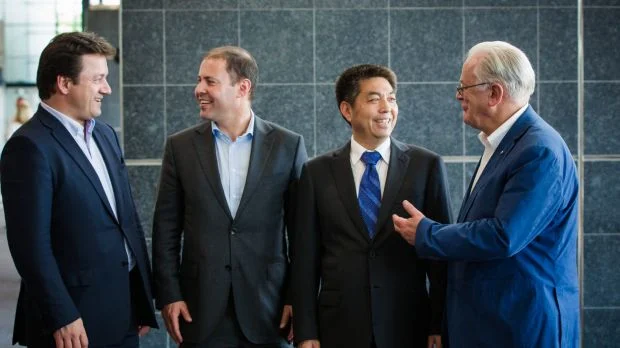Critics of Fairfax and the ABC might scorn Australia's liberal media for its alleged biases, but when it comes to investigative journalism The Age and The Sydney Morning Herald continue to outflank their competitors.
A week ago today, Fairfax and the ABC reported on Chinese "money-talks" influence over Australian politics, and in the process exposed a sewer of questionable behaviour.
Special Minister of State Scott Ryan: plans to introduce donations legislation to Parliament in spring. Photo: Alex Ellinghausen
Special Minister of State Scott Ryan: plans to introduce donations legislation to Parliament in spring. Photo: Alex Ellinghausen
The simple truth is that neither side of politics would be welcoming the sort of investigations that have exposed sleazy behaviour by the political class on all sides.
Maverick senator Cory Bernardi was not overstating things when he said in reference to the political donations scandal there was "something rotten in the state of Denmark".
In these remarks, he was not referring to the ghost of a fallen king, rather he was describing a state of affairs in which a lax set of protocols enables parties to accept foreign donations whose intent is to influence the political process.
Australia is the only English-speaking democracy to allow such donations, apart from New Zealand which caps contributions at $NZ1500.
The Fairfax-Four Corners investigation also uncovered an awkward detail for former trade minister Andrew Robb. This is that before he relinquished his seat at the July 2 election he accepted a lucrative consultancy with a Chinese company which is paying him close to $1 million for his services.
While we are not suggesting any illegality in Robb's arrangements with the Landbridge company, nor that he has infringed the letter of a ministerial code of conduct that seeks to stop former ministers taking advantage of their public service for a full 18 months after leaving office, it was unwise of him to enter into the Landbridge arrangement before he actually left Parliament.
Ye Cheng, of Landbridge, and then trade minister Andrew Robb in 2015. Photo: Glenn Campbell
Ye Cheng, of Landbridge, and then trade minister Andrew Robb in 2015. Photo: Glenn Campbell
In a text message, Robb insisted indignantly there was no conflict between his previous role as trade minister and his current brief as a consultant to Landbridge "to assist with their global ambitions".
Nevertheless, his engagement by a company that successfully tendered for control of part of the Darwin Port draws a shaft of light to one of the murkier areas of public service, and invites this question.
What rules should apply to former ministers and public servants in pursuit of commercial opportunities after they leave politics and the bureaucracy?
The short answer is that protocols that prevent any perception of impropriety should be rigorously applied and policed by an ethics commissioner in the national Parliament.
At the same time, both sides of politics should put aside their resistance to the establishment of a national integrity commission along the lines of independent commissions against corruption at the state level.
A parliamentary committee has been taking submissions on such a commission. No reasonable argument would seem to exist to delay active consideration of a federal integrity watchdog to police a soiled intersection between politics and money, including the activities of a pestilential lobbying class.
Space here does not permit a description of the various examples of former ministers, Labor and Coalition, who have slithered into well-paid lobbying jobs, or board positions that would never have been available to them if they had not sucked on the public teat. These examples are numerous.
Ministerial code of conduct rules drafted by former Labor senator John Faulkner – an indefatigable campaigner for ethical standards – and renewed by incoming governments are meant to stop former ministers taking advantage of their knowledge and connections.
But in reality, and despite Faulkner's best efforts, you could drive a horse and cart through these protocols.
An examination of rules that apply in Britain, the US and Canada reveal that restrictions in those jurisdictions are more rigorous than those applying in Australia.
In Canada, for example, ministers are precluded from accepting work that might conflict with their previous employment for a full two years.
The US has both an Office of Congressional Ethics and an Office of Government Ethics.
In Britain former prime minister David Cameron, under pressure over secretive contacts with media proprietors, added the following provision to the Ministerial Code in 2011.
"All meetings with newspaper and other proprietors, editors and senior executives will be published quarterly regardless of the purpose of the meeting."
What a good idea!
But back to the political donations scandal in which Chinese entrepreneurs have been splashing guanxi money around for no reason other than altruism, they would have you believe.
This is nonsense, of course, and demands remedies. The Chinese word guanxi as a noun refers to backdoor relationships.
Special Minister of State Scott Ryan tells me he plans to introduce donations legislation to Parliament in spring to bring Australia into line with other Western democracies.
May we suggest that as a simple rule all foreign donations are banned. Those restrictions should apply not simply to political parties themselves, but to ancillary political organisations involved in electioneering activities.
Might we also suggest the Australian Electoral Commission be required to report political donations in a more timely manner. Far too much time elapses between donations having been made and details being made available for public scrutiny.
Tony Walker is a Fairfax Media columnist.


